

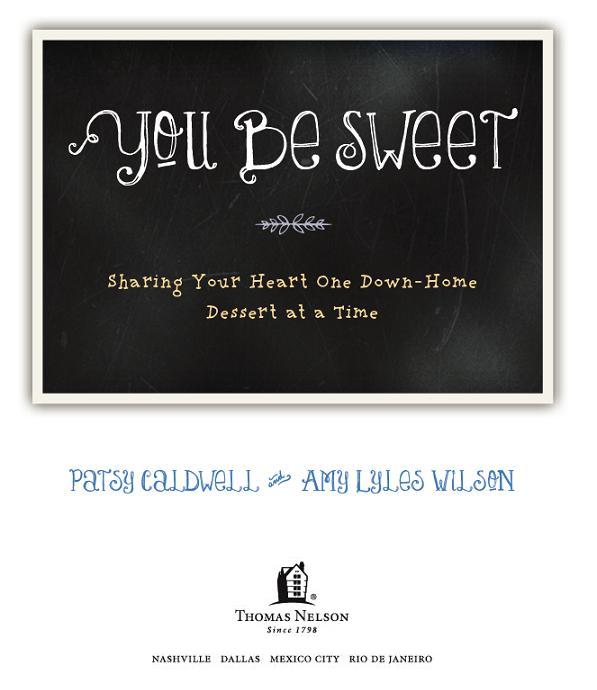 2012 by Amy Lyles Wilson, Patsy Caldwell, and Bryan Curtis All rights reserved. No portion of this book may be reproduced, stored in a retrieval system, or transmitted in any form or by any meanselectronic, mechanical, photocopy, recording, scanning, or otherexcept for brief quotations in critical reviews or articles, without the prior written permission of the publisher. Published in Nashville, Tennessee, by Thomas Nelson. Thomas Nelson is a registered trademark of Thomas Nelson, Inc. Photography by Ron Manville Food Styling by Teresa Blackburn Photos on Thomas Nelson, Inc., titles may be purchased in bulk for educational, business, fund-raising, or sales promotional use. For information, please e-mail SpecialMarkets@ThomasNelson.com.
2012 by Amy Lyles Wilson, Patsy Caldwell, and Bryan Curtis All rights reserved. No portion of this book may be reproduced, stored in a retrieval system, or transmitted in any form or by any meanselectronic, mechanical, photocopy, recording, scanning, or otherexcept for brief quotations in critical reviews or articles, without the prior written permission of the publisher. Published in Nashville, Tennessee, by Thomas Nelson. Thomas Nelson is a registered trademark of Thomas Nelson, Inc. Photography by Ron Manville Food Styling by Teresa Blackburn Photos on Thomas Nelson, Inc., titles may be purchased in bulk for educational, business, fund-raising, or sales promotional use. For information, please e-mail SpecialMarkets@ThomasNelson.com.
Library of Congress Cataloging-in-Publication Data Caldwell, Patsy, 1939 You be sweet : sharing your heart one down-home dessert at a time / Patsy Caldwell, Amy Lyles Wilson. p. cm. Includes bibliographical references and index. ISBN 978-1-4016-0173-7 (hardback) 1. I. I.
Wilson, Amy Lyles, 1961 II. Title. TX773.C245 2012 641.86dc23 2012009400 Printed in the United States of America 12 13 14 15 16 QG 6 5 4 3 2 1 To the memory of my father, Hayden Foster. He loved sweets, and because of that, we had dessert with every meal. Also, to my brothers and sisters, Edward, Elizabeth, Jr., Louise, Juanita, Tess, Don, and Billy. PATSY CALDWELL In honor of my sisters, Ann Holifield and Ginny Mounger, and my husband, Henry Dennis Granberry III, who have taught me, through food and other means, what it means to be a family.
AMY LYLES WILSON 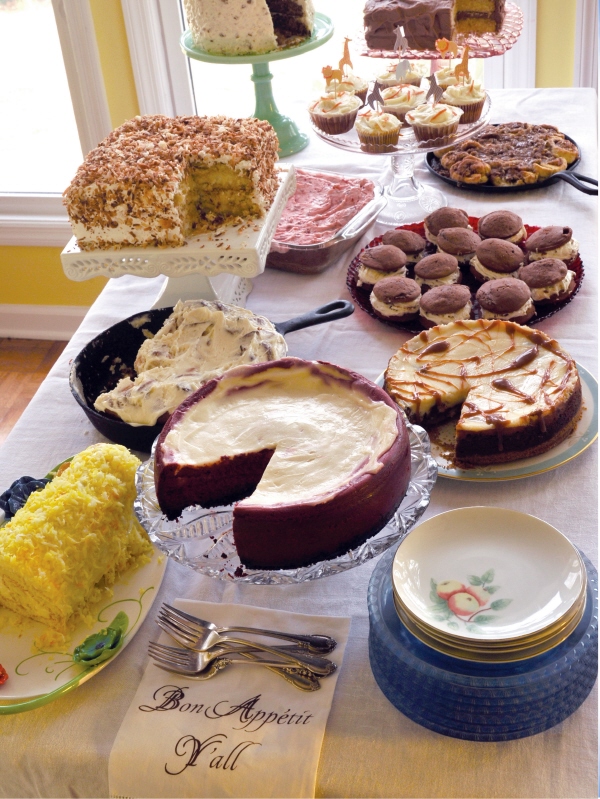 CONTENTS About the Authors You be sweet, my mother said to me as long ago as 1967, when I was six years old and heading off to my first day of school at Hattie Casey Elementary. She uttered those same words as recently as last week when I left her at the retirement home in Mississippi where she lives to drive the four hundred miles back to my home in Tennessee. Like generations of other Southerners, that phrase has served my family well for decades, regardless of the occasion. Mother practically raised my two sisters and me on those three little words, along with be careful, mind your manners, and always wear a slip. No doubt her own mother offered similar instruction to her when she was growing up as the only daughter in a family of three sons in rural Mississippi in the 1920s and 1930s. The all-purpose phrase saw me through my childhood: You be sweet, Mother advised as I went next door to jump on a neighbors trampoline; You be sweet, she said when I told her the clique in junior high wanted little to do with me; You be sweet, she repeated when, in my twenties, I relocated to a town where I knew nary a soul; and now, You be sweet, she says as we hang up the phone from our long-distance calls.
CONTENTS About the Authors You be sweet, my mother said to me as long ago as 1967, when I was six years old and heading off to my first day of school at Hattie Casey Elementary. She uttered those same words as recently as last week when I left her at the retirement home in Mississippi where she lives to drive the four hundred miles back to my home in Tennessee. Like generations of other Southerners, that phrase has served my family well for decades, regardless of the occasion. Mother practically raised my two sisters and me on those three little words, along with be careful, mind your manners, and always wear a slip. No doubt her own mother offered similar instruction to her when she was growing up as the only daughter in a family of three sons in rural Mississippi in the 1920s and 1930s. The all-purpose phrase saw me through my childhood: You be sweet, Mother advised as I went next door to jump on a neighbors trampoline; You be sweet, she said when I told her the clique in junior high wanted little to do with me; You be sweet, she repeated when, in my twenties, I relocated to a town where I knew nary a soul; and now, You be sweet, she says as we hang up the phone from our long-distance calls.
You might be led to think I wasnt a nice person, as often as Mother has encouraged me to be sweet. And if she trotted out the harsher translation, Dont be uglynot to be interpreted, as it was by a friend whos not from around here, as a demand to look prettyI knew I had better watch my step. Surely I was overreacting when someone was rude to me at school, wasnt I? Didnt I want the best for the person who was promoted over me at work despite my seniority? But I dare say I grew up as decent and civilized as the next girl in the Deep South, born to a culture crammed full of tradition, hospitality, and decorum. Its what we say, like bless your heart and yall come back. Its also how we live. These customs are such a part of me that I cant imagine not having the terms in my lexicon.
I even catch myself telling the dog, Hiram, to be sweet when I leave him alone in the house. What I really mean, I suppose, is Dont chew up the furniture, but thats not what flows from my mouth. I say it to my husband when hes on his way to the driving range, unlikely to interact with another human being for two solid hours (which, if the truth be known, is his preference). There are myriad ways to be sweet, of course, such as volunteering at the homeless shelter, remembering Aunt Carlisles birthday, and writing thank-you notes. And then there is food: baking a pie for a new neighbor, icing a cake for a coworker who is ill, or mixing up a batch of brownies for a family gathering. As with Bless Your Heart: Saving the World One Covered Dish at a Time, Patsy Caldwell and I invite you to consider that the recipes in You Be Sweet are about more than food.
We like to think they present opportunities for connection and community, and we hope they inspire you to serve up a piece to others as an expression of welcome, sympathy, celebration, or concern. For we believe that the sharing of food is akin to the sharing of ones heart, and we can think of no better way for us to be sweet to one another. AMY LYLES WILSON  Back in Idas day, women had babies without making a fuss or calling attention to themselves. They simply got married, got pregnantin that orderand ran an announcement in the local paper heralding the childs arrival. Maybe some friends at church hosted a tasteful shower in the fellowship hall, with punch and an ice ring of frozen fruit. Quite possibly, there were pastel-colored mints in glass bowls and a sheet cake with roses.
Back in Idas day, women had babies without making a fuss or calling attention to themselves. They simply got married, got pregnantin that orderand ran an announcement in the local paper heralding the childs arrival. Maybe some friends at church hosted a tasteful shower in the fellowship hall, with punch and an ice ring of frozen fruit. Quite possibly, there were pastel-colored mints in glass bowls and a sheet cake with roses.
The gifts were practical, like cloth diapers and handmade bibs. But there were no printed invitations, no party favors, and certainly no games requiring you to drink punch out of a sippy cup. The more experienced mothers wished you well and offered you sound advice. Then you went home, wrote your thank-you notes, and got down to the business of raising your young one as best you could. Of course, baby showers arent the only societal norm that has changed since Ida was young. Take television, for instance.
For the life of her, Ida cant figure out why people seem to be fascinated by something called reality TV. Surely their own lives should be interesting enough without needing to spend countless hours watching strangers try to outwit one another on an island or housewives fight over one anothers husbands. And Ida has yet to comprehend exactly what the Internet is or why everyone under fifty needs to check something called e-mail constantly. Her own grandchildren are glued to their cell phones every time they visit her. Sometimes Ida wonders why they bother to come at all, but she knows the answer to that in her heart of hearts: Ida raised her daughter, Claire, right. So Claire knows that its proper to bring the grandchildren to visit their grandmother.
And she does, every two weeks like clockwork. All Ida can do is shake her head when she thinks back to Claires first pregnancy. Even before she was showing, Claire hired a childbearing coach and signed up for seminars about raising confident children. It wasnt long before she circulated petitions calling for the town council to provide a breastfeeding station in the library and organized community workshops on how to prepare organic baby food. Eventually Claire parlayed her maternal knowledge and enthusiasm into a top-rated mommy blog. Ida has no idea what a blog is, shes sorry to say, but she knows it provides Claire with a sense of accomplishment and purpose.
Next page
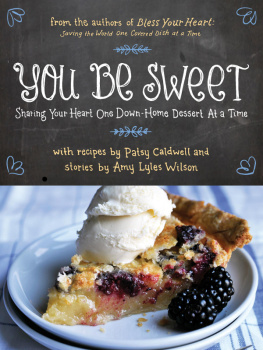





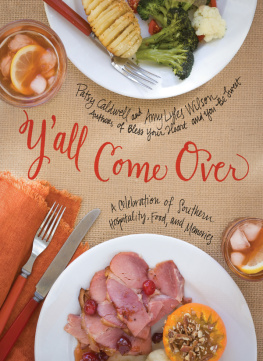
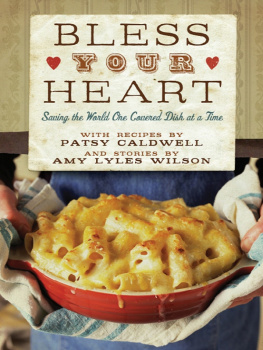




 2012 by Amy Lyles Wilson, Patsy Caldwell, and Bryan Curtis All rights reserved. No portion of this book may be reproduced, stored in a retrieval system, or transmitted in any form or by any meanselectronic, mechanical, photocopy, recording, scanning, or otherexcept for brief quotations in critical reviews or articles, without the prior written permission of the publisher. Published in Nashville, Tennessee, by Thomas Nelson. Thomas Nelson is a registered trademark of Thomas Nelson, Inc. Photography by Ron Manville Food Styling by Teresa Blackburn Photos on Thomas Nelson, Inc., titles may be purchased in bulk for educational, business, fund-raising, or sales promotional use. For information, please e-mail SpecialMarkets@ThomasNelson.com.
2012 by Amy Lyles Wilson, Patsy Caldwell, and Bryan Curtis All rights reserved. No portion of this book may be reproduced, stored in a retrieval system, or transmitted in any form or by any meanselectronic, mechanical, photocopy, recording, scanning, or otherexcept for brief quotations in critical reviews or articles, without the prior written permission of the publisher. Published in Nashville, Tennessee, by Thomas Nelson. Thomas Nelson is a registered trademark of Thomas Nelson, Inc. Photography by Ron Manville Food Styling by Teresa Blackburn Photos on Thomas Nelson, Inc., titles may be purchased in bulk for educational, business, fund-raising, or sales promotional use. For information, please e-mail SpecialMarkets@ThomasNelson.com. CONTENTS About the Authors You be sweet, my mother said to me as long ago as 1967, when I was six years old and heading off to my first day of school at Hattie Casey Elementary. She uttered those same words as recently as last week when I left her at the retirement home in Mississippi where she lives to drive the four hundred miles back to my home in Tennessee. Like generations of other Southerners, that phrase has served my family well for decades, regardless of the occasion. Mother practically raised my two sisters and me on those three little words, along with be careful, mind your manners, and always wear a slip. No doubt her own mother offered similar instruction to her when she was growing up as the only daughter in a family of three sons in rural Mississippi in the 1920s and 1930s. The all-purpose phrase saw me through my childhood: You be sweet, Mother advised as I went next door to jump on a neighbors trampoline; You be sweet, she said when I told her the clique in junior high wanted little to do with me; You be sweet, she repeated when, in my twenties, I relocated to a town where I knew nary a soul; and now, You be sweet, she says as we hang up the phone from our long-distance calls.
CONTENTS About the Authors You be sweet, my mother said to me as long ago as 1967, when I was six years old and heading off to my first day of school at Hattie Casey Elementary. She uttered those same words as recently as last week when I left her at the retirement home in Mississippi where she lives to drive the four hundred miles back to my home in Tennessee. Like generations of other Southerners, that phrase has served my family well for decades, regardless of the occasion. Mother practically raised my two sisters and me on those three little words, along with be careful, mind your manners, and always wear a slip. No doubt her own mother offered similar instruction to her when she was growing up as the only daughter in a family of three sons in rural Mississippi in the 1920s and 1930s. The all-purpose phrase saw me through my childhood: You be sweet, Mother advised as I went next door to jump on a neighbors trampoline; You be sweet, she said when I told her the clique in junior high wanted little to do with me; You be sweet, she repeated when, in my twenties, I relocated to a town where I knew nary a soul; and now, You be sweet, she says as we hang up the phone from our long-distance calls. Back in Idas day, women had babies without making a fuss or calling attention to themselves. They simply got married, got pregnantin that orderand ran an announcement in the local paper heralding the childs arrival. Maybe some friends at church hosted a tasteful shower in the fellowship hall, with punch and an ice ring of frozen fruit. Quite possibly, there were pastel-colored mints in glass bowls and a sheet cake with roses.
Back in Idas day, women had babies without making a fuss or calling attention to themselves. They simply got married, got pregnantin that orderand ran an announcement in the local paper heralding the childs arrival. Maybe some friends at church hosted a tasteful shower in the fellowship hall, with punch and an ice ring of frozen fruit. Quite possibly, there were pastel-colored mints in glass bowls and a sheet cake with roses.